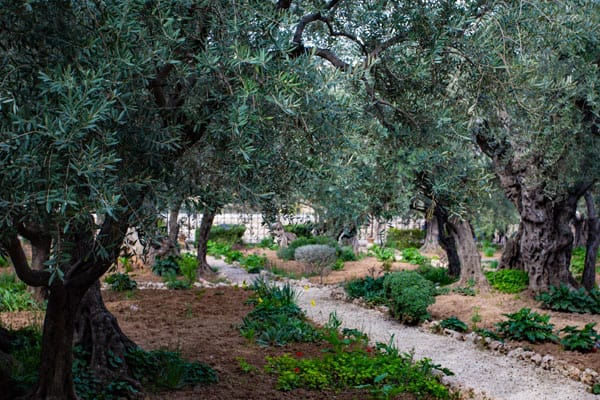During this period of lockdown I have, personally, found plenty of time to think things over. This may not be true for everyone – for example home-schooling parents, essential workers and frontline health workers who are undoubtedly as busy as ever – yet the same reality of the world situation is assaulting us all in one way or another.
My train of thought has not been the easiest journey; full of questions, confusion and the temptation towards fear. Nevertheless, I have heard God speaking to me, and more recently, I have sensed a consistent theme. If you’ll let me share some of my thoughts with you, I believe He is teaching me something important that you might also benefit from.
The other day, I was doing some Bible study and preparation for teaching online at the Eastgate School of Spiritual Life. I had some worship songs playing in the background, an auto-selection on YouTube, so I had no idea what song was coming next.
The subject of my study had been sparked into life by the words of a friend, who was sharing some ideas about “maintaining hope” on Facebook live. She said, “Hope is not a thought or an idea, hope is a person”, and I was immediately stirred in my spirit. I have often taught that Jesus took theological and philosophical ideas, and transformed them into personal reality in Himself, for example “I am the resurrection”, “I am the way, the truth and the life” and “I am the bread of life”. So this wasn’t a new train of thought for me, but the thought that Jesus is hope suddenly interested me on a new and different level. It occurred to me that Jesus said these things about himself when he was not only God, but also a human being, and as I considered the humanity of Jesus once again, my thoughts took me back to the garden of Gethsemane:
The Bible talks about this in Luke chapter 22, verse 39:
Jesus went out as usual to the Mount of Olives, and his disciples followed him. On reaching the place, he said to them, “Pray that you will not fall into temptation.” He withdrew about a stone’s throw beyond them, knelt down and prayed, “Father, if you are willing, take this cup from me; yet not my will, but yours be done.” An angel from heaven appeared to him and strengthened him. And being in anguish, he prayed more earnestly, and his sweat was like drops of blood falling to the ground. When he rose from prayer and went back to the disciples, he found them asleep, exhausted from sorrow. “Why are you sleeping?” he asked them. “Get up and pray so that you will not fall into temptation.”
While he was still speaking a crowd came up, and the man who was called Judas, one of the Twelve, was leading them. He approached Jesus to kiss him, but Jesus asked him, “Judas, are you betraying the Son of Man with a kiss?” When Jesus’ followers saw what was going to happen, they said, “Lord, should we strike with our swords?” And one of them struck the servant of the high priest, cutting off his right ear. But Jesus answered, “No more of this!” And he touched the man’s ear and healed him. Then Jesus said to the chief priests, the officers of the temple guard, and the elders, who had come for him, “Am I leading a rebellion, that you have come with swords and clubs? Every day I was with you in the temple courts, and you did not lay a hand on me. But this is your hour—when darkness reigns.”
This is a graphic description of the anguish Jesus felt as he faced the cross, making a choice at extraordinary cost. The Bible says that “it was for the joy set before him that Jesus endured the cross.” Jesus had a future hope, but that hope did not cancel out or bypass the enormous pain and distress of that moment.
As I was reading this passage and considering it, the worship music continued playing in the background, and I came to the realisation that song after song contained the idea of waiting. God was definitely teaching me something specific here, as it suddenly occurred to me that you cannot separate the concept of hope from the concept of waiting.
If I am hoping for something, I am waiting.
Jesus waited for the cross to become reality, understanding what lay ahead and needing strengthening from an angel. Jesus waited until the third day to be raised from the dead. The disciples waited for the Holy Spirit to be given to them in full measure.
Jesus chose to trust and obey his Father in heaven even in the most difficult time, and he accepted the help offered to him. He was confident, but he was vulnerable. And even in his darkest final moments, he still demonstrated his love and power by healing the servant’s ear.
Looking at the verse “Father, if you are willing, take this cup from me; yet not my will, but yours be done”, I asked myself a question: “Is the example of Jesus demonstrated through the manner in which I wait?” What matters is our posture as we endure that testing in-between time, being sure that we are:
• Asking honest questions.
• Being vulnerable and willing to receive help.
• Trusting in God.
• Willing to pay the price of following Jesus.
Finally, the last verse struck me with great force where Jesus said “But this is your hour—when darkness reigns.”
Jesus said that darkness was reigning. However, he knew it was only temporary, just an hour, figuratively speaking. What Jesus was about to do would transform eternity, and he considered it a price worth paying.
It occurs to me that at this very moment “darkness” is enforcing its reign upon the world in great measure, in the form of sickness and fear. However, it is only temporary. So I would encourage you to wait and hope like Jesus, knowing that light will always overcome darkness, and that as you trust and follow God, you also will help to shape eternity.
2 Cor 4:16 Therefore we do not lose heart. Though outwardly we are wasting away, yet inwardly we are being renewed day by day. For our light and momentary troubles are achieving for us an eternal glory that far outweighs them all. So we fix our eyes not on what is seen, but on what is unseen, since what is seen is temporary, but what is unseen is eternal.


